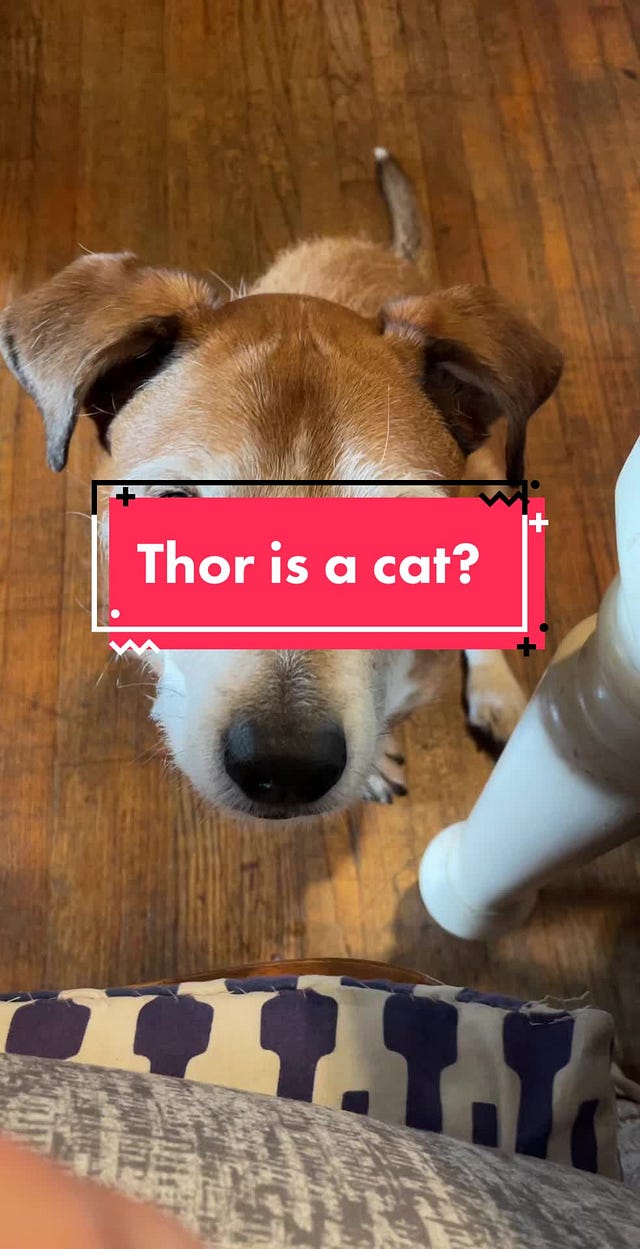From Banker Barbie to Business Coach: Pam Covarrubias Always Expected to Be a Childfree Latina
Reacting when people say, "ay, probrecita. No tuviste hijos."
This post may contain affiliate links. For more information, please see my Disclosure Policy.
Catch up with Part 1 and Part 2 of this interview, or listen the whole episode of The Dangers of Calladita Se Ve Más Bonita with Pam Covarrubias on Apple:
In Part 3 of our interview, Pam and I are going to continue the thread of shame and calladita culture we started in Part 2 as we talk about being childfree Latinas. Trigger warning: this portion of the interview includes mention of Polycystic Ovary Syndrome (PCOS) and a miscarriage. If these are sensitive topics for you, please skip today’s post completely, or scroll down to the first pull quote.
If PCOS is something you’re more interested in hearing about from another childfree Latina, please check out the episode called Your Childfree Cheerleader with Breanna Aguilar.
Paulette: I wrote a book for my niece when she went to college called Benchmarks are Bullshit. It was all the things I wish I had known when I went off to college to prepare for the culture shock and all of these things. [Because] you're considered an adult, but you're still so naïve about certain things. And one of the [lessons in the book] was that decisions are not life sentences. There are so few things in this world that you can't reverse course on. And of the few things, having children is permanent.
I just knew for myself [I wasn’t going to have kids]. That doesn't mean I hate children. And I think that that's a huge disconnect when women are pitted against each other, those who have children and those who do not have children. Have you faced any friction in that way?
Pam: Of course! I think less now. When I was 13 years old, I realized I had PCOS and the doctor at the time said, ponte la idea que (translation: get used to the idea that) you're never gonna have kids, because it's really hard when you have PCOS.
At that moment it was kinda like a self-fulfilling prophecy because...I played with dolls all the time. I had like a collection of Barbies But my games were like, she's a banker and she works at an office. It was never we're getting married and having babies. [That] was never part of my games.
So when I heard this from the doctor, I was like well, I didn't want them anyway! So I grew up with this internalized idea of me not ever being able to have kids. It was never part of my story. You know, when you write [that] when you grow up, this is who I'm going to become. It was never part of my story.
And then I found out that I could have kids cause I had a miscarriage and I was like, “oh, then he was wrong! But good to know.”
I think at this point my family's like, “she's not gonna have kids.” For a while my mom would be like, “well, nietos.” (Translation: grandkids.) But then my sister started having kids and so I think she had her fix with her kids. And then my sister and I joke that my niece and nephew, they're my kids too.
We went on vacation last week en Mexico, estábamos en Cancun (translation: they traveled to Cancun, Mexico). And of course because of that "everyone needs to have children" [mentality], the people there thought I was the mom. Because my sister's younger than me. And she's like, “no, I'm the mom! But she's the mom too. She borrows them from time to time.”
So yeah, I've had the questions. I mean, it's part of the journey also that I've embarked into standing in my power and say, “that's none of your business. Like whatever happens with my body. Why do you care?”
I'm a Scorpio also, so I like to sting sometimes. Like “mejor ya no me preguntan, pero si pasa todo el tiempo.” (Translation: they don’t want to risk asking me anymore, but yeah it happens all the time.)
I've even had like from strangers, like “ay, probrecita. No tuviste hijos.” (Translation: oh you poor thing, you never had kids!) And I'm like, “this is really interesting how you project all your feelings.”
“That's none of your business. Like whatever happens with my body. Why do you care?”
Above, Pam mentioned that she “borrows” her niece and nephew from time to time. Here she’s illustrating how she proved to herself that moms get more productive after they have children. That statement alone might upset some childfree people, but that’s okay. If this rubs you the wrong way, remember that it’s just the reality for two different women whose lives are not yours. So if it worked for them, great.
If you're feeling unproductive, don't worry. Having a kid won't necessarily change that for you. What changed for Pam was how she allocated that finite time, and that's something all of us can do through the use of the Pomodoro method or any number of other intentional time management techniques.
Paulette: On one of your podcasts you talked about how you take your niece and nephew for a month because it increases your productivity, which is a totally own brand for you. Tell me about that.
[35:30] Pam: That started as a social experiment because I did an interview with this guest sharing her story of how she ended up having kids later in life. And during that conversation, she said, “I became much more productive.” And I was like, “BS, there's no way!”
And she said, “I promise you Pam. Data shows that mothers are 60% more productive* than non-mothers, because you just need learn to prioritize your time.”
BS! Called my sister and I was like, “send me your kids. I need to prove this.” And she was like, “don't ask me twice.” My sister lives in Kansas City, so she sent the kids to San Diego for a month. And I became 60% more productive!
And what I realized is that the reason for this [is] because time becomes so much more finite. What I ended up doing when I had the kids was I truly focused on the 20 minutes I had before the kids woke up. On the 30 minutes while they were eating lunch. And so I would get so much done in a smaller amount of time.
Which proves also Newton's Law of you use up the time that you're given. So that's how it happened. And then my sister was like, “next summer you down?”
Paulette: And now you can't say no!
Pam: Now that the kids are older, actually, they're like, “we wanna spend summer with our friends.” So now they've chosen to stay, but I go there and hang out. I like to see my kids from time to time.
My mom friends often talk to me about non-kid stuff. They can talk about kids with their mom friends, and then they are anything but moms when they hang out with me.
Even though Pam’s relationship with her niblings isn’t what every childfree person wants to have, it works for her. And that's just one model of what a vida más chévere (translation: your best life) can look like. She’s living her best life. That's Pam's version of la vida más chévere.
In this last portion of our interview, we talked about what her adult friendships look like.
Pam: I would say 50% of my friends have kids and maybe 50% don't. And my mom friends often talk to me about non-kid stuff. They always tell me, “I love that you understand that I have to cancel at the last minute. I love that you understand that somebody vomited and I just can't get on the phone with you.” I mean, things happen with kids, you know?
And so instead of us talking about their kids, conversations with me are about like anything but. From what they've told me, they appreciate that because they have their mom friends. They can talk about kids with their mom friends, and then they are anything but moms when they hang out with me.
When people say, “is [Thor] a rescue?” I often respond, “he rescued me.”
Speaking of moms, like some (not all !!!) childfree people, Pam is a dog mom. When she calls her dog her “perrhijo,” she means her dog is like her son. His name is Thor.
Paulette: You mentioned your dog earlier. How's Thor?
Pam: Thor is getting old. He's 10. He's now getting to the place where he sleeps a lot, which is great for me. He's awesome. He's my perrhijo. It's funny because when we were little, my mom was like anti-dogs. She was like, “I'm a single mom, I have three kids. That's enough to take care of. I can't take care of another life.”
My siblings and I joke that we had glimpses of dogs and then they would disappear. Like we adopted one and then all of a sudden dog was gone. Kind of a side note, but I think that helped me a lot to be detached. Could be a toxic trait, too.
But Thor's doing well. He's just getting old. And when I got him, I remember my mom gave me this little tarjetita (translation: a card) that talked about how dogs leave us first. And she's like, “I know this is your dog. This is not a dog that I can take away from you like before. I know you're going to keep him and I want you to understand that he's going to leave you first, and this is why.”
And so it was this beautiful card, written of why dogs leave you first. And so I think he still has some life, but it's 10. He's a senior dog now. When people say, “is he a rescue?” I often respond, “he rescued me.” He literally appeared at a time when I needed him to be there. He was three months when he came to my life.
We wish Thor and Pam a many more happy years together. Catch a glimpse of Thor (becoming an AI cat) in Pam’s TikTok video:
 Tiktok failed to load.
Tiktok failed to load.Enable 3rd party cookies or use another browser
Find Pam on her podcast, Cafe con Pam, and her website, Spread Ideas Move People.
To read the rest of the conversation, check out these posts:
*This law blog post does a good job breaking down the data around this statistic (specific to the law profession), but pay special attention to this section:
Although this overall picture is a bright one, there are dark spots. First, as the authors of the study point out, they did not include women who dropped out of the tenure-track job market altogether, leaving the mothers in the study more likely to be high-achieving “survivor” types who are particularly adept at balancing careers and family.







